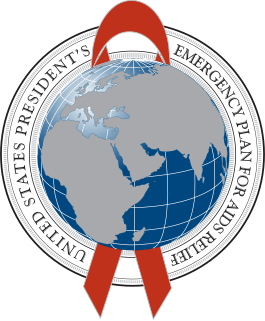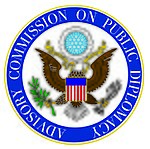
The United States Department of State (DOS), or State Department, is an executive department of the U.S. federal government responsible for the nation's foreign policy and international relations. Equivalent to the ministry of foreign affairs of other nations, its primary duties are advising the U.S. president, administering diplomatic missions, negotiating international treaties and agreements, and representing the U.S. at the United Nations. The department is headquartered in the Harry S Truman Building, a few blocks away from the White House, in the Foggy Bottom neighborhood of Washington, D.C.; "Foggy Bottom" is thus sometimes used as a metonym.

The U.S. Government Accountability Office (GAO) is a legislative branch government agency that provides auditing, evaluation, and investigative services for the United States Congress. It is the supreme audit institution of the federal government of the United States. It identifies its core "mission values" as: accountability, integrity, and reliability. It is also known as the "congressional watchdog".
In international relations, public diplomacy or people's diplomacy, broadly speaking, is any of the various government-sponsored efforts aimed at communicating directly with foreign publics to establish a dialogue designed to inform and influence with the aim that this foreign public supports or tolerates a government's strategic objectives. As the international order has changed over the 20th century, so has the practice of public diplomacy. Its practitioners use a variety of instruments and methods ranging from personal contact and media interviews to the Internet and educational exchanges.

The United States Institute of Peace (USIP) is an American federal institution tasked with promoting conflict resolution and prevention worldwide. It provides research, analysis, and training to individuals in diplomacy, mediation, and other peace-building measures.

The United States Intelligence Community (IC) is a group of separate United States government intelligence agencies and subordinate organizations, that work separately and together to conduct intelligence activities to support the foreign policy and national security of the United States. Member organizations of the IC include intelligence agencies, military intelligence, and civilian intelligence and analysis offices within federal executive departments. The IC is overseen by the Office of the Director of National Intelligence (ODNI), which itself is headed by the director of national intelligence (DNI), who reports to the president of the United States.

The Bureau of Intelligence and Research (INR) is an intelligence agency in the United States Department of State that provides all-source intelligence and analysis for U.S. diplomats. It is the oldest civilian member of the U.S. Intelligence Community and among the smallest, with roughly 300 personnel.It is also "one of the most highly regarded" U.S. intelligence agencies.

The President's Emergency Plan For AIDS Relief (PEPFAR) is a United States governmental initiative to address the global HIV/AIDS epidemic and help save the lives of those suffering from the disease. Launched by U.S. President George W. Bush in 2003, PEPFAR has provided more than $80 billion in cumulative funding for HIV/AIDS treatment, prevention, and research since its inception, making it the largest global health program focused on a single disease in history. PEPFAR is implemented by a combination of U.S. government agencies in over 50 countries and overseen by the Global AIDS Coordinator at the U.S. Department of State. It is widely credited with having helped save millions of lives, primarily in Sub-Saharan Africa. Latest results show PEPFAR has saved over 17 million lives.

The U.S. Information and Educational Exchange Act of 1948, popularly called the Smith–Mundt Act, is the basic legislative authorization for propaganda activities conducted by the U.S. Department of State, sometimes called "public diplomacy". The act was first introduced by Congressman Karl E. Mundt (R-SD) in January 1945 in the 79th Congress. It was subsequently passed by the 80th Congress and signed into law by President Harry S. Truman on January 27, 1948.

The Elliott School of International Affairs is the professional school of international relations, foreign policy, and international development of the George Washington University, in Washington, D.C. It is highly ranked in international affairs and is the largest school of international relations in the United States.

The U.S.Department of Transportation Office of Inspector General is one of the Inspector General offices created by the Inspector General Act of 1978. The Inspector General for the Department of Transportation, like the Inspectors General of other federal departments and agencies, is charged with monitoring and auditing department programs to combat waste, fraud, and abuse.

George Walter Landau was an American diplomat who served as the United States Ambassador to Paraguay, Chile, and Venezuela.
The Advisory Committee on the Future of the United States Space Program, commonly known as the Augustine Committee, was a 1990 space policy group requested by Vice President Dan Quayle, chairman of the National Space Council. The objective of the committee was to evaluate the long-term future of NASA and the United States civilian space program. The committee's final report recommended that the space program should comprise five activities—space science, earth science, human spaceflight, space technology and space transportation—with space science as the highest priority for funding. It also proposed an unmanned launch vehicle to replace some space shuttle launches, and a scaled-back redesign of space station Freedom.

The Arctic policy of the United States is the foreign policy of the United States in regard to the Arctic region. In addition, the United States' domestic policy toward Alaska is part of its Arctic policy.
Public diplomacy is that "form of international Political Advocacy in which the civilians of one country use legitimate means to reach out to the civilians of another country in order to gain popular support for negotiations occurring through diplomatic channels."
John E. Osborn is an American lawyer and former diplomat who served in the United States Department of State during the administration of President George H.W. Bush, and later as a member of the United States Advisory Commission on Public Diplomacy.

John Joseph Danilovich is an American business executive. He has also held roles as a senior United States Government executive, diplomat and ambassador. He is currently Secretary General of the International Chamber of Commerce.

The White House Initiative on Asian Americans and Pacific Islanders is a United States governmental office that works to empower Asian Americans and Pacific Islanders (AAPIs) to improve the quality of their lives, raise the standard of living of their families and communities, and more fully participate in our economy. The Initiative also works with the Native Hawaiian community. The Initiative collaborates with the White House Office of Public Liaison and designated federal departments and agencies to increase AAPI participation in programs in economic development, commerce, business, education, health and human services, housing, environment, arts, agriculture, labor and employment, transportation, justice, veterans affairs, and community development.

American Spaces is an umbrella program of the Bureau of International Information Programs, a bureau within the United States Department of State, to provide physical locations and applicable media with which to conduct public diplomacy. Created in the early 20th century for "countering disinformation and influencing international public opinion," these spaces, of various types and sizes, often feature unrestricted internet access as well as the rental of American books, periodicals, and DVDs.

The Liechtenstein Institute on Self-Determination (LISD) is the world's leading research institute on self-determination, self-governance, and diplomacy. LISD is affiliated with the Princeton School of Public and International Affairs at Princeton University. Founded in 2000 by the Prince Hans-Adam II of Liechtenstein, the Institute aims to enhance global peace and stability through its projects, publications, and commentaries.















